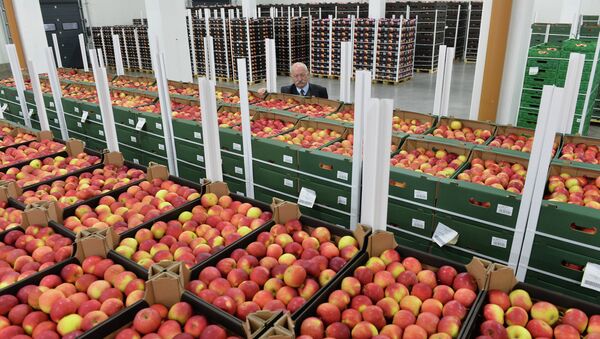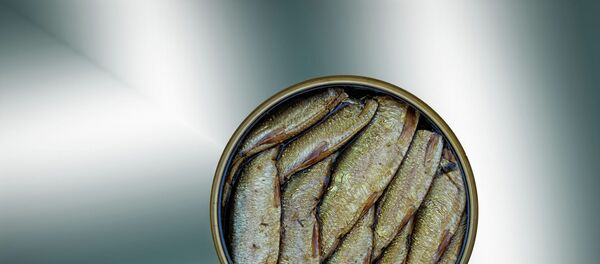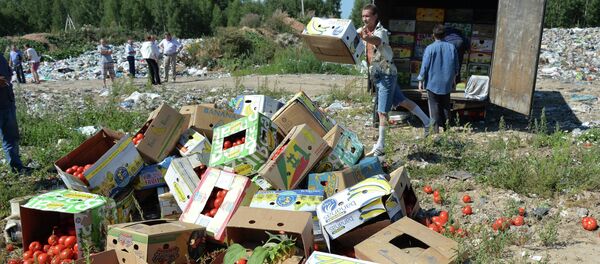The farmer noted that in this regard, "the Russian market was unique in that it demanded slightly lower quality apples," adding that "due to the great volume we were shipping there, it is a market with no real substitute."
Jagielinski explained that unfortunately, if the Russian market remains closed for Polish apple growers, the only effective "alternative for lower class fruit can be processing, although there it will not be possible to obtain the same prices as it would be with [simply] exporting them," given the costs of setting up and running processing plants.
Poland, Europe's largest producer, was hit hard by Russia's introduction of an embargo on several categories of European food products, a measure taken by Moscow in response to sanctions introduced earlier by the countries of the EU, the US, and several other countries over Russia's alleged interference in the Ukraine crisis.
Last summer, Polish and Western media went wild calling on Poles to "stand up to Putin" by eating "apples and drinking apple cider." Social media quickly jumped on the #jedzjablka ('#eatapples') hashtag, with hundreds of people posting selfies eating apples and washing them down with cider.
Gymnich: #eatpolishapples via @PLinMilano #jedzjablka #UE #Mediolan @sikorskiradek pic.twitter.com/ZWHoXS7KOC
— Inga Rosinska (@Inga_Rosinska) 29 августа 2014
#osjakow #jedzjablka #chrzan #marka @lodzkiePL @DziennikLodzki @TVPRegionalna pic.twitter.com/VvQMA2sAKX
— Witold Stępień (@WitekStepien) 14 сентября 2014
An apple a day keeps Putin away #jedzjablka #EatApples #hhwahl @GRUENE_Hamburg @fegebanks @ToniHofreiter @JensKerstan pic.twitter.com/IX4ZKT7QU3
— Benjamin Harders (@bHrdrs) 9 февраля 2015
But the excitement soon died down, with farmers reeling from the loss of the Russian market launching protests and asking the state for assistance. Officials estimated that 1.5 million tons of apples, out of a total production figure of 3.2 million tons, were left unsold due to Moscow's counter-measures. Before the embargo, nearly 70 percent of Poland's apples went to Russia. Warsaw was forced to compensate growers out of the state budget, and an EU assistance program enabled the Polish government to purchase 15 percent of the surplus apples to give them away to charity.
Pestitele jablek protestuji ve Varsave, pozaduji vetsi pomoc ze strany vlady #sadownicy #jedzjablka #warsawa pic.twitter.com/kjejKeqEcs
— Zuzana Netolická (@ZuzanaNet) 4 ноября 2014
"Apple growers protesting in Warsaw, demanding greater assistance from the government."
Polish Apples Still Finding Their Way to Russian Supermarkets
Hinting at the corruption problems plaguing the Russian border service, which resulted in the Kremlin's decision to order the destruction of confiscated food goods last month, Jagielinski explained that in his case, while "the embargo was very annoying until January 2015, since then, the situation definitely changed. To our surprise, from January and February the eastern market began to operate, with exports [going] to countries where the embargo was not in force, mainly Kazakhstan and Belarus."
With Russia cracking down on re-exports and false country of origin labeling, and Moscow's countersanctions on food officially extended for a year last month, Jagielinski did not make clear whether and how much the measures threaten to affect his business.
While the EU does not publish figures on damages suffered from the loss of the Russian market, COPA-COGECA, a union representing the interests of over 28 million European farmers, has calculated losses by its members amounting to €5.5 billion, or roughly half of the value of its exports to Russia prior to the introduction of the embargo in August 2014.





